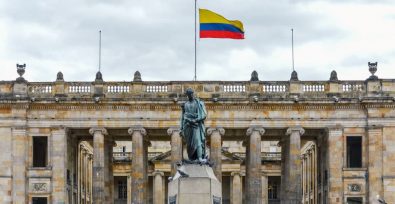After 17 years and 8 failed attempts, Colombia’s President Gustavo Petro has enacted law 2447 of 2025 banning child marriage in the country. In 2024, Colombia’s Congress approved the removal of Article 117 form its civil code, which allowed individuals over 14 years old to marry with parental consent. The new law now prohibits all forms of marriage in which one or both parties are under the age of 18, without exception. This marks a significant step towards eradicating child marriage in Latin America, the only region in the world that has failed to reduce the child marriage in the last 25 years.
Colombian Congress now 30% women-led
In December, The Latin Times reported that efforts to remove Article 117 began in 2007 and were attempted 7 more times between 2015 and 2021. All attempts failed—either shelved by the Senate or withdrawn by their sponsors. Some congressmen argued that the amendment would “ban love” and claimed adolescents should be allowed to marry while exploring their sexuality. A lack of quorum and prioritization for children’s rights also contributed to the failures.
Jennifer Pedraza, a congresswoman for Colombia’s Dignity and Commitment Party, credits part of their success to the Colombian Congress being 30% women-led. Pedraza recalls:
“The 30% of women in Congress was important because of the way the debate happened. Many of my colleagues were willing to share their own life stories, those of their mothers, their grandmothers, and [explain] the systematic violence that emerged [from these underage unions]. Thanks to these interventions by my colleagues from all parties, even those who had reservations became obliged to either vote positively, or abstain from voting,”
Lawmakers first introduced the “They Are Girls, Not Brides” bill in August 2023. After passing four debates in Colombia’s Chamber of Representatives and Senate, policymakers verified the law. Under Law 2447, Colombia will launch a national program called ‘Life Projects for Children and Adolescents’, focusing on prevention and support to survivors. The law also requires awareness campaigns in high-risk areas to educate communities about the dangers of child marriage and early unions.
The prevalence of child marriage in Latin America
In Colombia, around 23% of girls and adolescents marry or enter unions before turning 18, with rates rising to between 40% and 65% in rural and indigenous communities. “María” (name has been changed) was 17 years old when she was deceived into a civil marriage with a man 22 years older than her. From that moment, she faced a nightmare of abuse, including sexual violence and even kidnapping.
In Latin America and the Caribbean, 25% of marriages involve at least one underage person. While regions like South Asia and Southern Africa have reduced their child marriage rates between 2000 and 2020, Latin America and the Caribbean rates have been fluctuating. UNICEF warns:
“If the observed trend continues, by 2030 Latin America and the Caribbean will have among the world’s highest levels of child marriage, trailing behind only sub-Saharan Africa,”
Child marriage in Latin America is usually informal. In Colombia for example, the State previously recognized a marital union when a couple begins living together and a patrimonial union after two years. As a result, the law acknowledged marital unions involving children without requiring marriage before a judge. Although the removal Article 117 will not criminalize the practice, it will now make marriage involving a person under the age of 18 illegal. Pedraza explains:
“This [punitive approach] was attempted in Mexico, and in having been declared a crime, girls victims of child marriage did not want to report to officials, or even go to the hospital when they had been beaten or when they were in labor, because they were fearful that their parents, cousins, siblings would be imprisoned or fined. This criminalization ultimately alienates boys, girls, women and adolescents victims of this form of violence, from the Colombian State institutions,”
The fight continues
Legal child marriage plays a major role in driving forced child marriage, a form of modern slavery. Without action, forced child marriage continues to trap girls in cycles of poverty, abuse, and inequality, undermining their potential and the future of entire communities.
According to Congresswoman Pedraza, Article 117 caused parents to marry off their daughters in exchange for money, livestock, land, or a home. These early unions often led to serious consequences, including a higher risk of domestic violence, sexual abuse, adolescent pregnancy, school dropout, and HIV infections.
Raising awareness and mobilizing communities are crucial to ensuring the success of policy changes like Law 2447. By educating citizens about the harms of child marriage and early unions, Colombia is taking significant steps to protect vulnerable children. Continued efforts to involve communities in this conversation and advocate for policy reforms are essential to eradicating child marriage worldwide and safeguarding the rights of future generations. Sign the petition today!







Freedom United is interested in hearing from our community and welcomes relevant, informed comments, advice, and insights that advance the conversation around our campaigns and advocacy. We value inclusivity and respect within our community. To be approved, your comments should be civil.